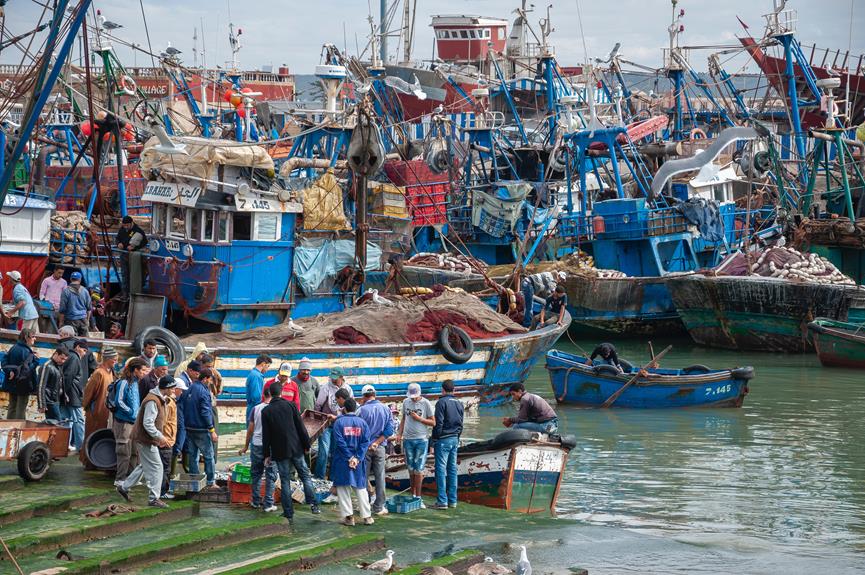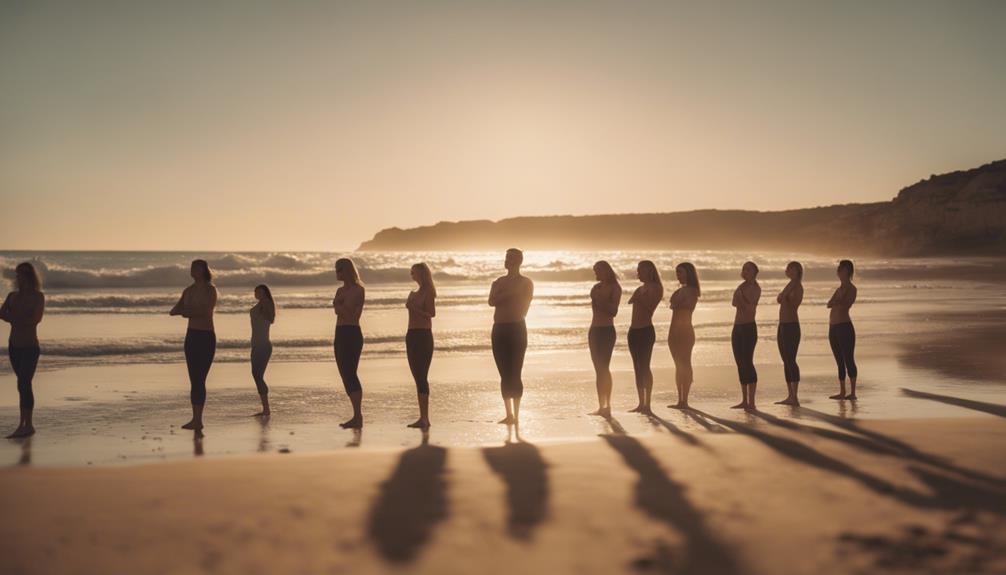As I explore the Algarve region in Portugal, I am amazed to discover that its fishing villages have managed to preserve their traditional way of life and cultural heritage.
Did you know that these villages, like Olho, attract thousands of visitors each year who are eager to experience the authentic Portuguese culture? With its charming old town, fisherman's quarter, and historical landmarks, Olho showcases the rich fishing history and maritime heritage of the region.
Not only that, but it also provides opportunities to relax in beautiful parks and explore the stunning islands of the Ria Formosa Natural Park.
By embracing tradition and preserving their unique cultural identity, these fishing villages in the Algarve continue to serve and delight visitors from all around the world.
Key Takeaways
- Fishing villages serve as living museums, showcasing the local culture and way of life.
- The fishing practices passed down through generations maintain an authentic Portuguese way of life.
- Modernization and tourism pose a threat to the traditional way of life of fishing communities.
- Promoting sustainable practices is crucial in preserving fishing heritage.
Historical Importance of Fishing Villages
The historical significance of fishing villages lies in their preservation of cultural heritage and economic sustainability.
Fishing villages, such as Olho in the Algarve region of Portugal, offer a glimpse into the rich fishing traditions that have shaped the local culture for centuries. These charming fishing villages serve as living museums, where the Portuguese culture and way of life are proudly showcased. The unique architecture and giant murals found in Olho's Fisherman's Quarter pay tribute to the local fishermen, telling the story of their struggles and triumphs.
Beyond preserving cultural heritage, fishing villages also play a crucial role in the economic sustainability of the region. The abundant fishing grounds provide a livelihood for the local communities, ensuring the continuation of traditional fishing practices.
Transitioning into the next section, it's important to explore the cultural significance of these fishing practices and how they contribute to the overall preservation of fishing villages.
Cultural Significance of Fishing Practices
Throughout my exploration of Olhão's fishing village, I've come to appreciate the cultural significance of fishing practices in shaping the community's identity and preserving its traditions.
Fishing isn't just a means of livelihood for the people of Olhão; it's deeply ingrained in their cultural heritage. The village's rich history is tied to the sea, and the fishing practices passed down through generations have helped maintain an authentic Portuguese way of life.
The fishing village is a living testament to the traditions and values that have been preserved over time. From the unique architecture of the Fisherman's Quarter to the stunning tile designs adorning the buildings, every aspect of the village showcases the importance of fishing in the community.
Challenges Faced by Traditional Fishing Communities
As a writer exploring the preservation of Algarve's fishing villages, I have encountered numerous challenges faced by traditional fishing communities. These communities, once bustling with activity and thriving on the abundance of the sea, now find themselves grappling with a changing world and an uncertain future. Let's take a closer look at the challenges they face:
| Challenges Faced by Traditional Fishing Communities |
|---|
| Decline in fishing industry |
| Modernization and tourism |
| Environmental changes |
| Aging population |
| Infrastructure development |
The decline in the fishing industry has greatly impacted the livelihoods of these communities, as the once bountiful catches have dwindled. Additionally, the rise of modernization and tourism in coastal areas poses a threat to the traditional way of life in fishing communities. Environmental changes, such as overfishing and pollution, further exacerbate the challenges faced by these communities, as they struggle with the availability of marine resources. Moreover, the aging population within these communities poses a threat to the continuity of fishing traditions, as younger generations seek alternative livelihoods. Lastly, the development of new infrastructure and urbanization in coastal areas can displace traditional fishing communities, leading to a loss of cultural heritage and identity. It is crucial that we address these challenges and find ways to support these communities in preserving their way of life.
Sustainable Tourism and Fishing Villages
Having explored the challenges faced by traditional fishing communities, I'm now eager to delve into the significant role that sustainable tourism plays in preserving Algarve's fishing villages.
- Fresh produce: Sustainable tourism in Algarve's fishing villages allows visitors to experience the abundance of fresh seafood and other local produce. From the daily catch of the fishermen to the vibrant markets, the region offers a culinary experience that celebrates the flavors of the sea.
- Regional delicacies: Sustainable tourism promotes the preservation of traditional recipes and cooking techniques, ensuring that the unique regional delicacies of Algarve's fishing villages continue to be enjoyed by both locals and visitors. From grilled sardines to cataplana, these dishes tell the story of the village's fishing heritage.
- Sandy beaches: Sustainable tourism practices in Algarve's fishing villages prioritize the conservation of the area's sandy beaches. These pristine stretches of coastline provide a tranquil setting for visitors to relax and enjoy the natural beauty of the surroundings.
- Ria Formosa Natural Park: Sustainable tourism allows visitors to explore the Ria Formosa Natural Park, a protected area that's home to a diverse range of flora and fauna. By promoting responsible tourism, the fishing villages contribute to the preservation of this unique ecosystem for future generations to enjoy.
Efforts to Preserve Algarve's Fishing Heritage
Preserving Algarve's fishing heritage involves actively promoting sustainable practices and engaging the local community in efforts to protect and celebrate their traditional way of life. In the village of Olhão, these efforts are evident in the preservation of its fishing villages and the promotion of its cultural heritage. One example is the Igreja Matriz, a beautiful church located in the heart of the Old Town. It not only serves as a place of worship but also showcases the region's rich history through its stunning architecture and intricate details. Additionally, the village's picturesque streets offer beautiful views of the Ria Formosa, a natural park known for its unspoiled sandy beaches. By preserving these fishing villages and their cultural heritage, Olhão ensures that future generations can continue to appreciate and enjoy the traditions of the Algarve's fishing communities.
| Efforts to Preserve Algarve's Fishing Heritage |
|---|
| – Promoting sustainable practices |
| – Engaging the local community |
| – Preserving the Igreja Matriz |
| – Celebrating the Old Town's architecture |
| – Showcasing the beautiful views of the Ria |
Frequently Asked Questions
What Is Algarve Portugal Known For?
In Algarve, Portugal, traditional fishing practices, cultural heritage, and coastal cuisine are well-known. The region's natural beauty attracts tourists, but it's important to consider the impact of tourism on preserving these fishing villages.
What Does the Name Algarve Mean in Arabic?
The name Algarve in Arabic means 'the west' or 'the western region.' It reflects the region's historical connections with the Arab world. Algarve's cultural heritage is evident in its traditional fishing practices, influence on Portuguese cuisine, and traditional architecture.
Is It the Algarve or Algarve?
It's the Algarve, not Algarve. The Algarve region is a popular tourist destination known for its stunning beaches and delicious cuisine. I love exploring the Algarve and embracing its rich traditions.
Is Faro the Same as Algarve?
No, Faro is not the same as Algarve. Faro is the capital city of the Algarve region. Algarve encompasses smaller towns and villages, each with unique traditions, cuisine, and attractions, including beautiful beaches.
Conclusion
As the sun sets over the charming fishing village of Olho, I can't help but feel a sense of awe and admiration for the resilience of these communities. Their commitment to preserving their heritage and way of life is truly inspiring.
However, the challenges they face are real and ongoing. Will future generations continue to embrace tradition and protect the cultural identity of these villages? Only time will tell.
But for now, let's cherish and support these fishing villages in the Algarve, for they're the keepers of a precious and fading treasure.



